Business Ethics Analysis: 7-Eleven's Ethical Dilemmas and Theories
VerifiedAdded on 2020/03/16
|5
|1007
|55
Essay
AI Summary
This essay examines the ethical issues at 7-Eleven, focusing on the 'half pay' scam and the exploitation of workers. It analyzes the case of an Indian student, Pendem, who faced long working hours and underpayment. The essay delves into the breaches of workplace laws and the Fair Work Ombudsman's investigations. It highlights the organization's involvement in wage fraud, the exploitation of workers, and the government's strict stance on these issues. The essay then applies three ethical theories – egoism, utilitarianism, and Kant's duty – to evaluate the actions of 7-Eleven. It concludes by emphasizing the unethical nature of the organization's practices and the need for introspection and ethical conduct within the business. The essay references several sources to support its arguments and analysis.
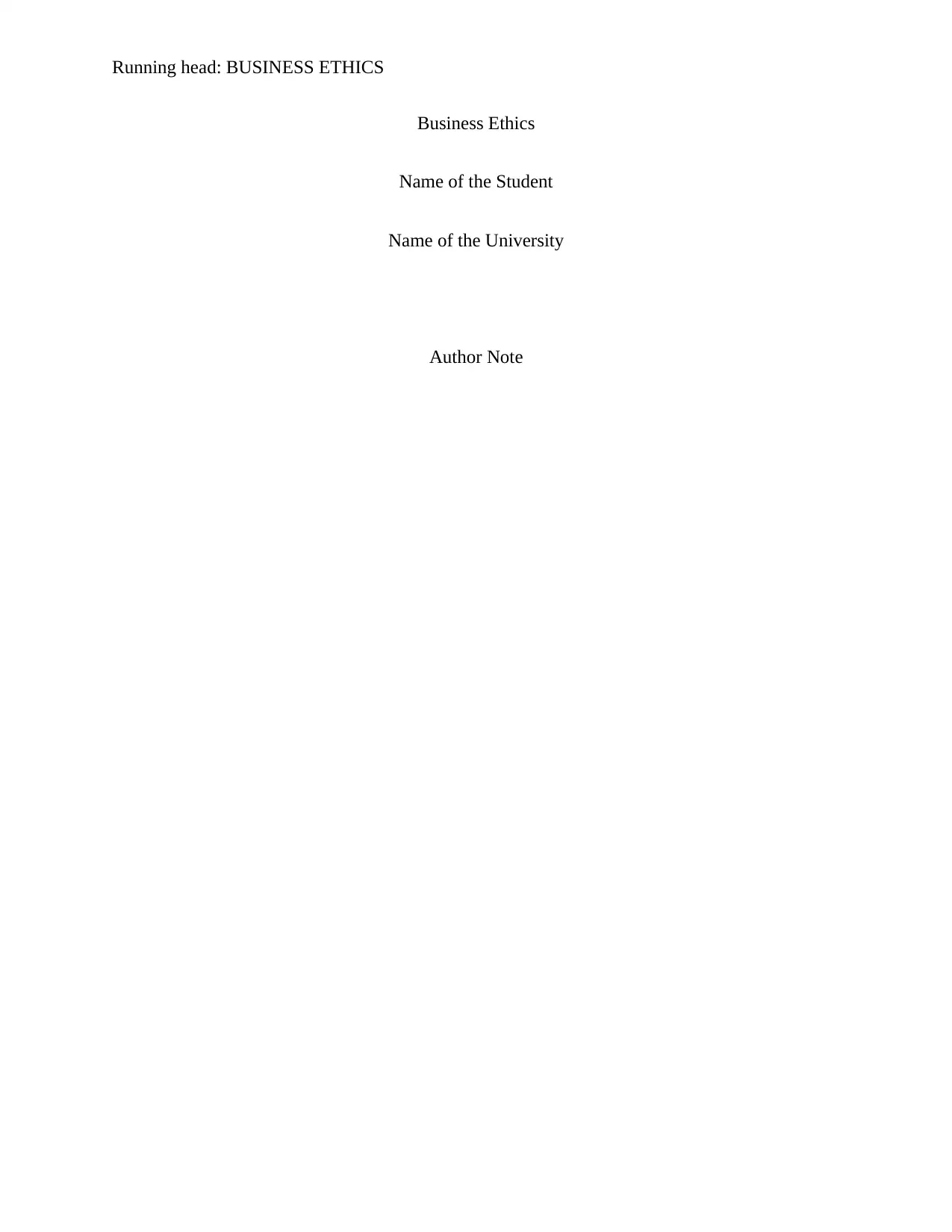
Running head: BUSINESS ETHICS
Business Ethics
Name of the Student
Name of the University
Author Note
Business Ethics
Name of the Student
Name of the University
Author Note
Paraphrase This Document
Need a fresh take? Get an instant paraphrase of this document with our AI Paraphraser
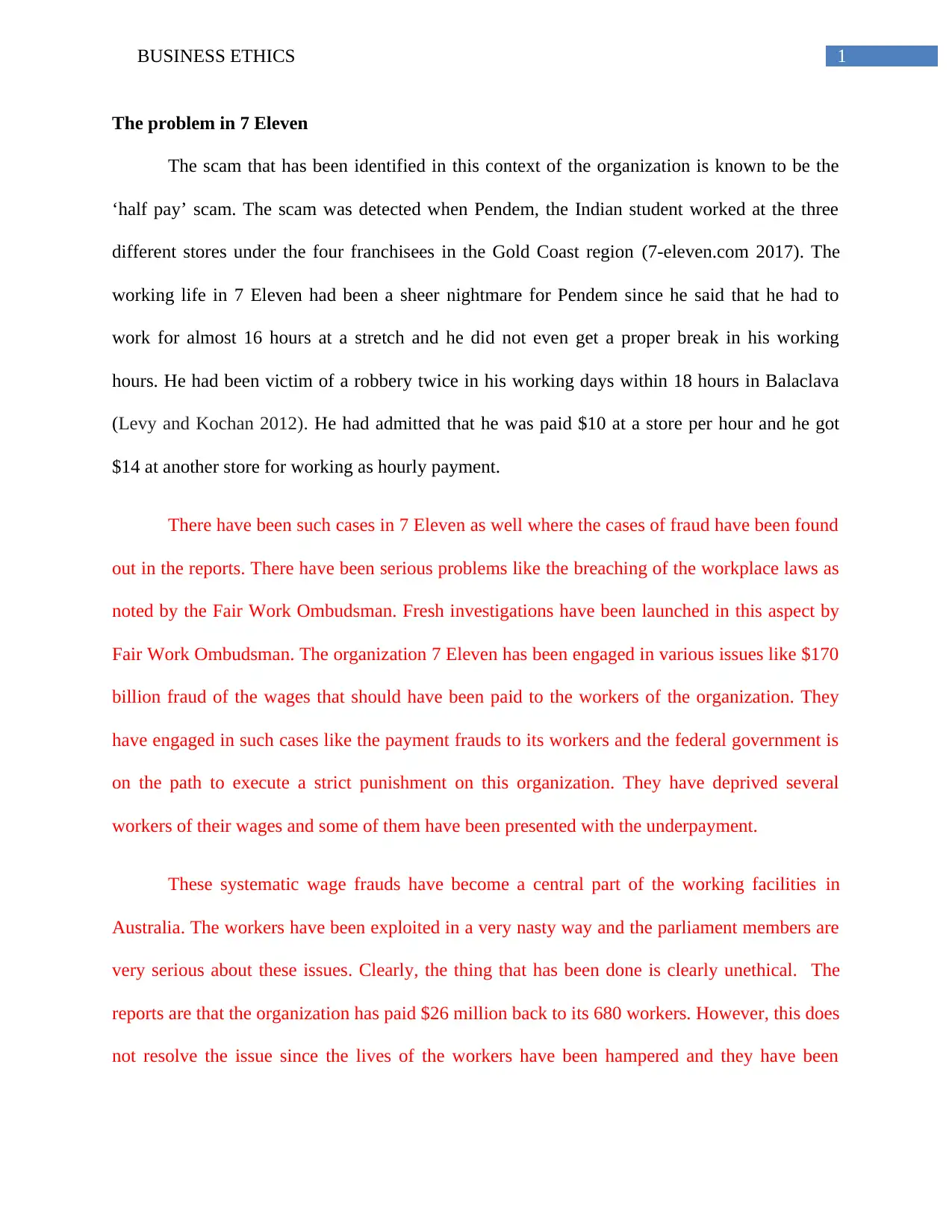
1BUSINESS ETHICS
The problem in 7 Eleven
The scam that has been identified in this context of the organization is known to be the
‘half pay’ scam. The scam was detected when Pendem, the Indian student worked at the three
different stores under the four franchisees in the Gold Coast region (7-eleven.com 2017). The
working life in 7 Eleven had been a sheer nightmare for Pendem since he said that he had to
work for almost 16 hours at a stretch and he did not even get a proper break in his working
hours. He had been victim of a robbery twice in his working days within 18 hours in Balaclava
(Levy and Kochan 2012). He had admitted that he was paid $10 at a store per hour and he got
$14 at another store for working as hourly payment.
There have been such cases in 7 Eleven as well where the cases of fraud have been found
out in the reports. There have been serious problems like the breaching of the workplace laws as
noted by the Fair Work Ombudsman. Fresh investigations have been launched in this aspect by
Fair Work Ombudsman. The organization 7 Eleven has been engaged in various issues like $170
billion fraud of the wages that should have been paid to the workers of the organization. They
have engaged in such cases like the payment frauds to its workers and the federal government is
on the path to execute a strict punishment on this organization. They have deprived several
workers of their wages and some of them have been presented with the underpayment.
These systematic wage frauds have become a central part of the working facilities in
Australia. The workers have been exploited in a very nasty way and the parliament members are
very serious about these issues. Clearly, the thing that has been done is clearly unethical. The
reports are that the organization has paid $26 million back to its 680 workers. However, this does
not resolve the issue since the lives of the workers have been hampered and they have been
The problem in 7 Eleven
The scam that has been identified in this context of the organization is known to be the
‘half pay’ scam. The scam was detected when Pendem, the Indian student worked at the three
different stores under the four franchisees in the Gold Coast region (7-eleven.com 2017). The
working life in 7 Eleven had been a sheer nightmare for Pendem since he said that he had to
work for almost 16 hours at a stretch and he did not even get a proper break in his working
hours. He had been victim of a robbery twice in his working days within 18 hours in Balaclava
(Levy and Kochan 2012). He had admitted that he was paid $10 at a store per hour and he got
$14 at another store for working as hourly payment.
There have been such cases in 7 Eleven as well where the cases of fraud have been found
out in the reports. There have been serious problems like the breaching of the workplace laws as
noted by the Fair Work Ombudsman. Fresh investigations have been launched in this aspect by
Fair Work Ombudsman. The organization 7 Eleven has been engaged in various issues like $170
billion fraud of the wages that should have been paid to the workers of the organization. They
have engaged in such cases like the payment frauds to its workers and the federal government is
on the path to execute a strict punishment on this organization. They have deprived several
workers of their wages and some of them have been presented with the underpayment.
These systematic wage frauds have become a central part of the working facilities in
Australia. The workers have been exploited in a very nasty way and the parliament members are
very serious about these issues. Clearly, the thing that has been done is clearly unethical. The
reports are that the organization has paid $26 million back to its 680 workers. However, this does
not resolve the issue since the lives of the workers have been hampered and they have been
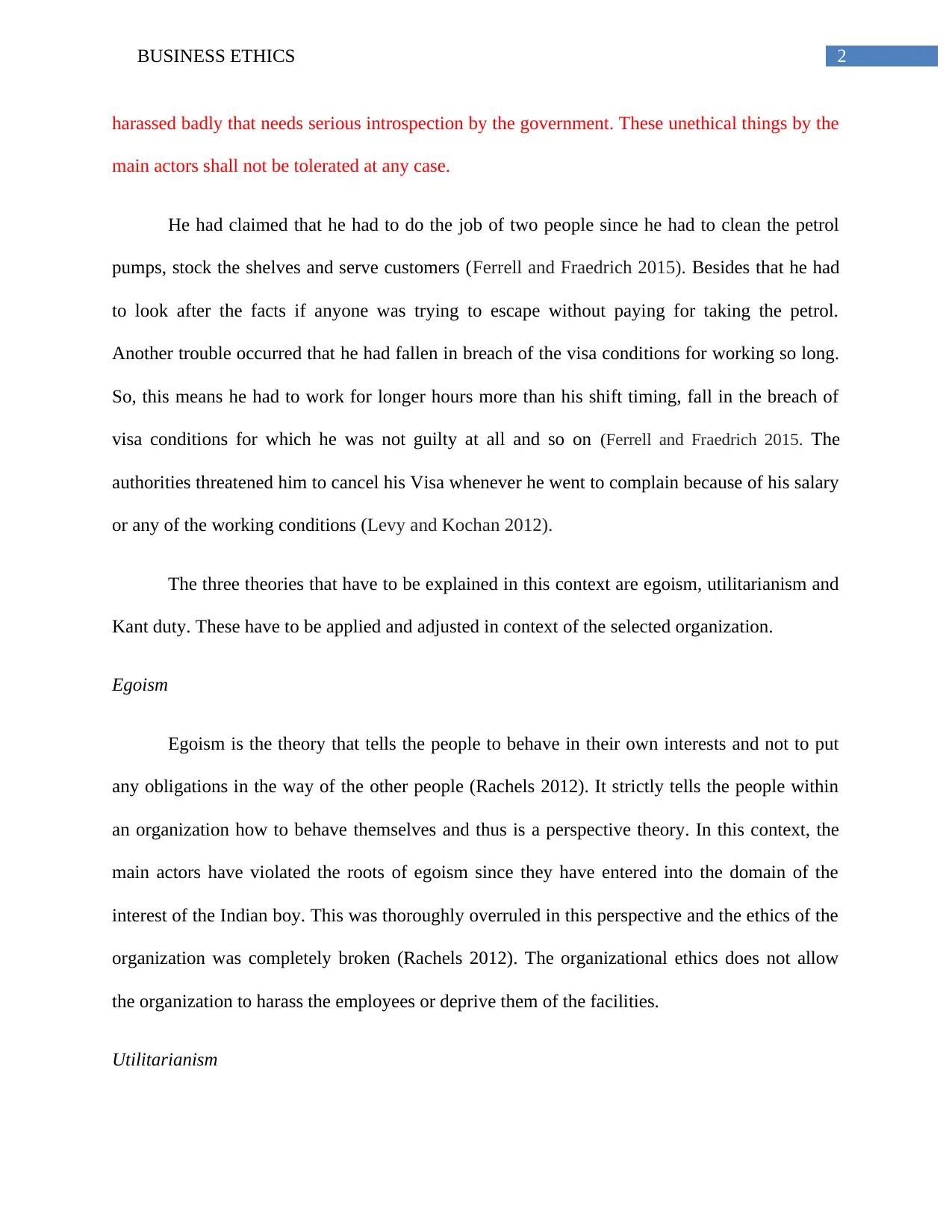
2BUSINESS ETHICS
harassed badly that needs serious introspection by the government. These unethical things by the
main actors shall not be tolerated at any case.
He had claimed that he had to do the job of two people since he had to clean the petrol
pumps, stock the shelves and serve customers (Ferrell and Fraedrich 2015). Besides that he had
to look after the facts if anyone was trying to escape without paying for taking the petrol.
Another trouble occurred that he had fallen in breach of the visa conditions for working so long.
So, this means he had to work for longer hours more than his shift timing, fall in the breach of
visa conditions for which he was not guilty at all and so on (Ferrell and Fraedrich 2015. The
authorities threatened him to cancel his Visa whenever he went to complain because of his salary
or any of the working conditions (Levy and Kochan 2012).
The three theories that have to be explained in this context are egoism, utilitarianism and
Kant duty. These have to be applied and adjusted in context of the selected organization.
Egoism
Egoism is the theory that tells the people to behave in their own interests and not to put
any obligations in the way of the other people (Rachels 2012). It strictly tells the people within
an organization how to behave themselves and thus is a perspective theory. In this context, the
main actors have violated the roots of egoism since they have entered into the domain of the
interest of the Indian boy. This was thoroughly overruled in this perspective and the ethics of the
organization was completely broken (Rachels 2012). The organizational ethics does not allow
the organization to harass the employees or deprive them of the facilities.
Utilitarianism
harassed badly that needs serious introspection by the government. These unethical things by the
main actors shall not be tolerated at any case.
He had claimed that he had to do the job of two people since he had to clean the petrol
pumps, stock the shelves and serve customers (Ferrell and Fraedrich 2015). Besides that he had
to look after the facts if anyone was trying to escape without paying for taking the petrol.
Another trouble occurred that he had fallen in breach of the visa conditions for working so long.
So, this means he had to work for longer hours more than his shift timing, fall in the breach of
visa conditions for which he was not guilty at all and so on (Ferrell and Fraedrich 2015. The
authorities threatened him to cancel his Visa whenever he went to complain because of his salary
or any of the working conditions (Levy and Kochan 2012).
The three theories that have to be explained in this context are egoism, utilitarianism and
Kant duty. These have to be applied and adjusted in context of the selected organization.
Egoism
Egoism is the theory that tells the people to behave in their own interests and not to put
any obligations in the way of the other people (Rachels 2012). It strictly tells the people within
an organization how to behave themselves and thus is a perspective theory. In this context, the
main actors have violated the roots of egoism since they have entered into the domain of the
interest of the Indian boy. This was thoroughly overruled in this perspective and the ethics of the
organization was completely broken (Rachels 2012). The organizational ethics does not allow
the organization to harass the employees or deprive them of the facilities.
Utilitarianism
⊘ This is a preview!⊘
Do you want full access?
Subscribe today to unlock all pages.

Trusted by 1+ million students worldwide
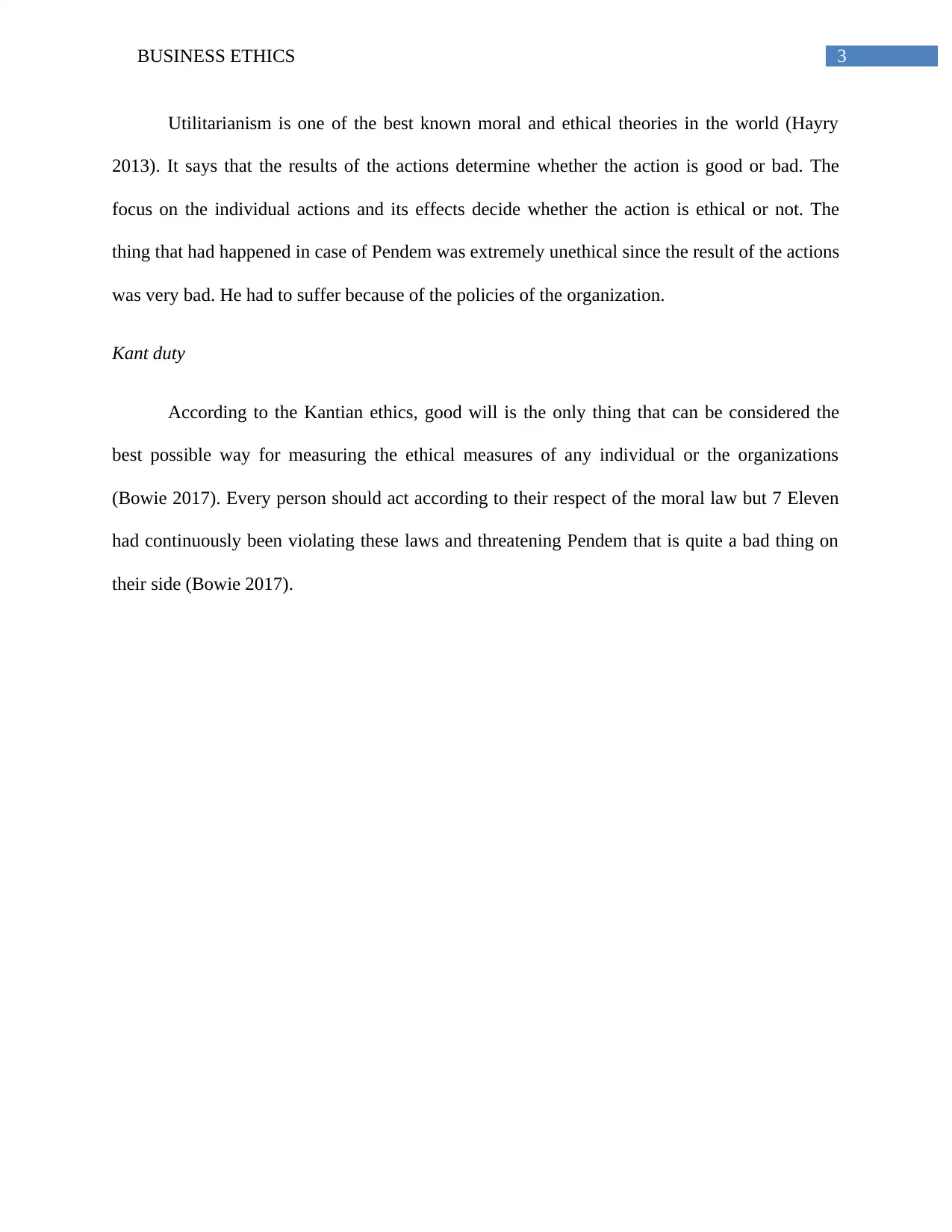
3BUSINESS ETHICS
Utilitarianism is one of the best known moral and ethical theories in the world (Hayry
2013). It says that the results of the actions determine whether the action is good or bad. The
focus on the individual actions and its effects decide whether the action is ethical or not. The
thing that had happened in case of Pendem was extremely unethical since the result of the actions
was very bad. He had to suffer because of the policies of the organization.
Kant duty
According to the Kantian ethics, good will is the only thing that can be considered the
best possible way for measuring the ethical measures of any individual or the organizations
(Bowie 2017). Every person should act according to their respect of the moral law but 7 Eleven
had continuously been violating these laws and threatening Pendem that is quite a bad thing on
their side (Bowie 2017).
Utilitarianism is one of the best known moral and ethical theories in the world (Hayry
2013). It says that the results of the actions determine whether the action is good or bad. The
focus on the individual actions and its effects decide whether the action is ethical or not. The
thing that had happened in case of Pendem was extremely unethical since the result of the actions
was very bad. He had to suffer because of the policies of the organization.
Kant duty
According to the Kantian ethics, good will is the only thing that can be considered the
best possible way for measuring the ethical measures of any individual or the organizations
(Bowie 2017). Every person should act according to their respect of the moral law but 7 Eleven
had continuously been violating these laws and threatening Pendem that is quite a bad thing on
their side (Bowie 2017).
Paraphrase This Document
Need a fresh take? Get an instant paraphrase of this document with our AI Paraphraser
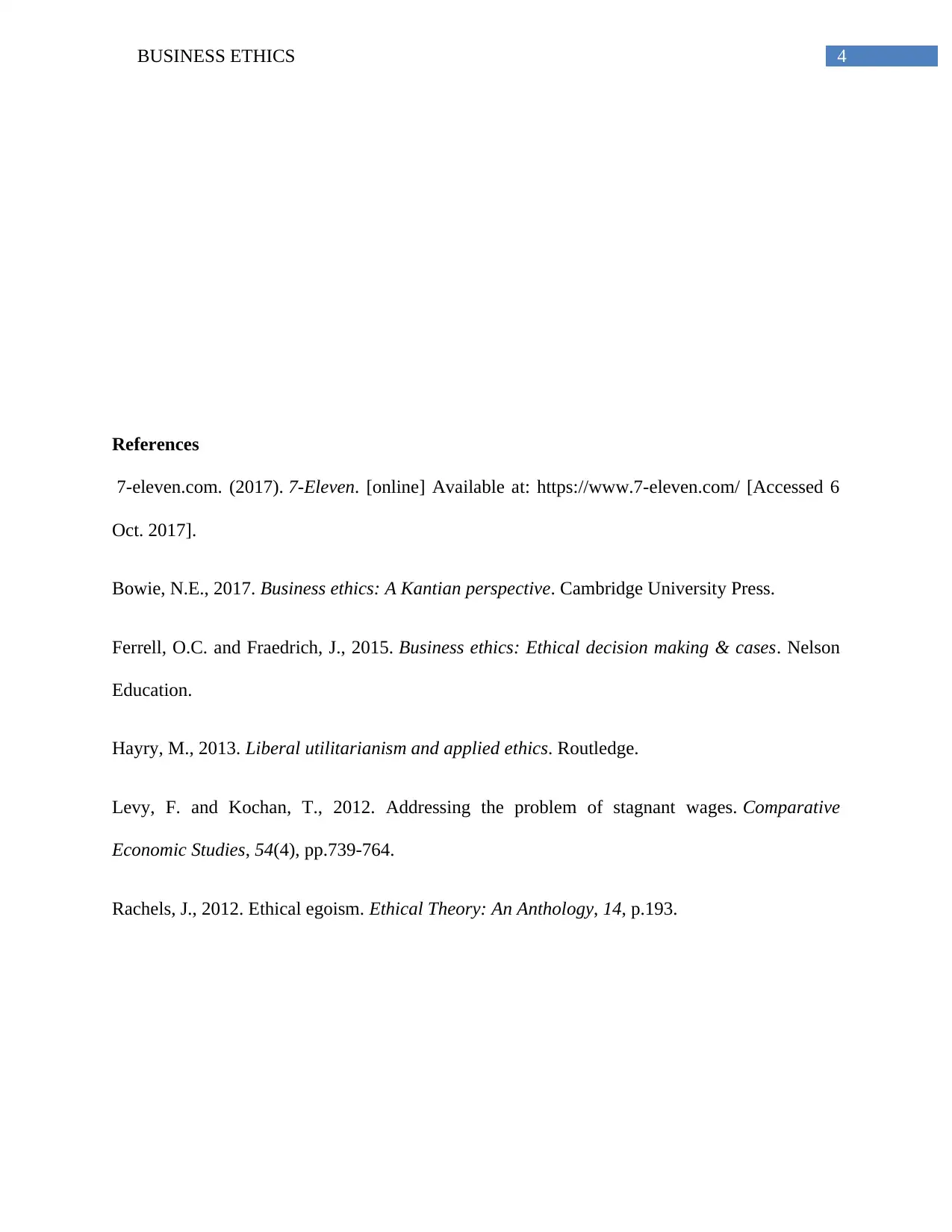
4BUSINESS ETHICS
References
7-eleven.com. (2017). 7-Eleven. [online] Available at: https://www.7-eleven.com/ [Accessed 6
Oct. 2017].
Bowie, N.E., 2017. Business ethics: A Kantian perspective. Cambridge University Press.
Ferrell, O.C. and Fraedrich, J., 2015. Business ethics: Ethical decision making & cases. Nelson
Education.
Hayry, M., 2013. Liberal utilitarianism and applied ethics. Routledge.
Levy, F. and Kochan, T., 2012. Addressing the problem of stagnant wages. Comparative
Economic Studies, 54(4), pp.739-764.
Rachels, J., 2012. Ethical egoism. Ethical Theory: An Anthology, 14, p.193.
References
7-eleven.com. (2017). 7-Eleven. [online] Available at: https://www.7-eleven.com/ [Accessed 6
Oct. 2017].
Bowie, N.E., 2017. Business ethics: A Kantian perspective. Cambridge University Press.
Ferrell, O.C. and Fraedrich, J., 2015. Business ethics: Ethical decision making & cases. Nelson
Education.
Hayry, M., 2013. Liberal utilitarianism and applied ethics. Routledge.
Levy, F. and Kochan, T., 2012. Addressing the problem of stagnant wages. Comparative
Economic Studies, 54(4), pp.739-764.
Rachels, J., 2012. Ethical egoism. Ethical Theory: An Anthology, 14, p.193.
1 out of 5
Related Documents
Your All-in-One AI-Powered Toolkit for Academic Success.
+13062052269
info@desklib.com
Available 24*7 on WhatsApp / Email
![[object Object]](/_next/static/media/star-bottom.7253800d.svg)
Unlock your academic potential
Copyright © 2020–2026 A2Z Services. All Rights Reserved. Developed and managed by ZUCOL.




